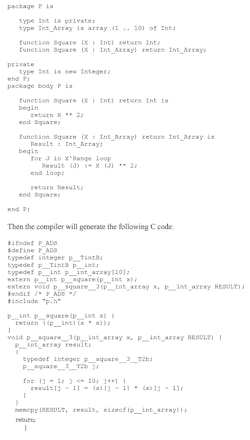With AdaCore’s latest GNAT Pro Ada compiler, it’s now possible to generate C source code using its Common Code Generator (CCG). This is designed to provide portability to the vast majority of platforms that have a C compiler. It was originally done to support the popular 8-bit Microchip AVR that AdaCore doesn’t support with its native code support targeting platforms, such as the 32- and 64-bit x86, ARM, RISC-V, and Power architectures.
Using CCG is just a matter of a command-line option (see codelist below). It handles a subset of Ada, but this still includes features like fixed-point support and the minimal standard library. Features not supported are ones that would be hard to implement or those not supported by C compilers like overflow checks. This is one reason to use support for SPARK, a provable subset of Ada. CCG works with SPARK applications.
Compiling Ada/SPARK code into C like this is as easy as a command-line switch.
The ability to insert assembly code inline is also missing. However, it’s possible to edit generated C code to do this since the C compiler supports such a feature.
The Ada.Real_Time runtime package is supported if rts_monotonic_clock and rts_delay_until procedures are provided. The online documentation covers the details of everything that is and isn’t supported.
Support for 8-bit platforms is just one reason to use CCG. It can handle other platforms that don’t support Ada and SPARK compilers.
If you want a quick way to learn basic Ada and SPARK programming, then check out AdaCore’s online training tools. You can edit source code online and have it compiled and executed.



